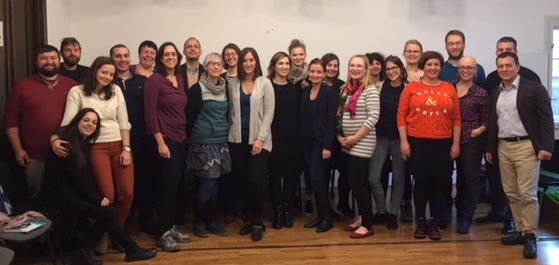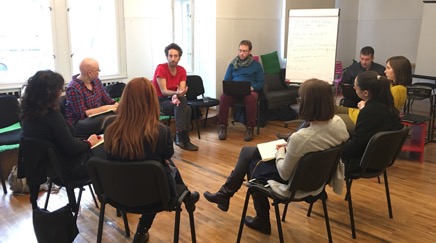The Unitarian Universalist Service Committee advances human rights through grassroots collaborations.
Collaborating to Serve Refugees in Challenging Times
By on November 17, 2017
This week UUSC organized a convening in Zagreb, Croatia of civil society organizations – many of them UUSC partners – serving Syrian refugees along the Balkan Route. Twenty-six representatives from 16 organizations came together to discuss how they can better coordinate their work, to problem-solve challenges that they face, and to expand their networks in neighboring countries in order to continue serving refugees. It was a privilege to provide the space and hear reflections and feedback from organizations on the front lines of this crisis, many of which experience scrutiny and harassment from their local governments. Because of those security interests we have chosen not to name specific participants.
On behalf of the UUSC family, Rachel Freed and I were grateful for the opportunity to spend time with this quality group of attorneys, case workers, and humanitarians striving to protect refugees in an environment where doing so is highly unpopular.

The groups who participated in the convening face extreme challenges: the closing space for civil society organizations in Eastern Europe, a rising tide of right-wing governments and factions, and general anti-immigrant sentiment throughout the region. When the Balkan Route closed in 2016, refugees headed for Western Europe were suddenly stuck in transit countries ill-equipped to serve the long-term needs of asylum-seekers. Further, both the refugees and the organizations providing services to them faced growing public hostility fueled by a misinformation media campaign similar to what we have recently seen in the United States. Governments are using increasingly aggressive, inhumane tactics to stop the tide of migrants, and there have been reports of border guards pouring water on freezing migrants in the middle of winter, using attack dogs, and other forms of violence and intimidation at border crossings.
As refugees wait for their claims to be processed they are often isolated from the rest of society in camps with varying degrees of accommodations and where their freedom of movement and access to services may be limited. In the camps, education opportunities for children are minimal, and psycho-social support is insufficient to deal with the trauma many have recently endured. The organizations who came together this week are among the only groups providing essential services ranging from legal assistance; protection against gender-based violence and the exploitation of unaccompanied minors; and mobile teams providing medical care. Case management is challenging and the formal systems of care and communication are insufficient. Gatherings, like the one held this week, help the organizations build their relationships—expanding informal networks which are frequently relied on to provide care in such a complex environment.

As the rest of the world turns its attention to other crises, these 16 organizations continue on until the job of resettling and assimilating refugees is done. Much of the funding that was available at the height of the crisis has moved elsewhere and what remains often comes with conditions that challenge the integrity of the mission-driven service providers. As such, the financial support of UUSC members is particularly crucial and we appreciate the generosity so many have shown to ensure we’re able to make a positive difference where we can.
Read Danielle’s pre-trip blog post, Balkans Convening Aims to Offer Support to Partner Refugee Organizations.
